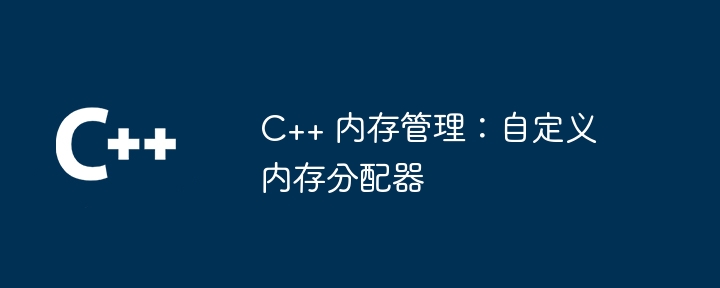Home >Backend Development >C++ >C++ Memory Management: Custom Memory Allocator
C++ Memory Management: Custom Memory Allocator
- WBOYWBOYWBOYWBOYWBOYWBOYWBOYWBOYWBOYWBOYWBOYWBOYWBOriginal
- 2024-05-03 14:39:011337browse
Custom memory allocator in C allows developers to adjust memory allocation behavior according to needs. Creating a custom allocator requires inheriting std::allocator and overriding the allocate() and deallocate() functions. Practical examples include: improving performance, optimizing memory usage, and implementing specific behaviors. When using it, you need to pay attention to avoid freeing memory, manage memory alignment, and perform benchmark tests.

C Memory Management: Custom Memory Allocator
In C, memory management is crucial to the performance and reliability of the program. It's important. By default, C uses the global allocators new and delete to allocate and free memory. However, in some cases this default allocator may not be fully satisfactory. Custom memory allocators allow developers to tailor memory allocation behavior to specific needs.
Create a custom memory allocator
To create a custom memory allocator, you can inherit std::allocator and override itallocate() and deallocate() functions. The allocate() function is responsible for allocating a specified number of bytes of memory, while the deallocate() function is responsible for releasing the previously allocated memory.
For example, the following code shows a simple custom memory allocator that allocates memory but does not release it:
class MyAllocator : public std::allocator<int> {
public:
int* allocate(size_t n) {
return (int*) malloc(n * sizeof(int));
}
void deallocate(int* ptr, size_t n) {}
};Practical case
Custom memory allocators are useful in the following situations:
- Improve performance: Custom allocators can increase the speed of memory allocation by customizing the allocation strategy. For example, allocation overhead can be reduced by using memory pools or page allocation.
- Optimize memory usage: Custom allocators can optimize memory usage by using specific size classes or buddy allocation algorithms.
- Implement specific behaviors: Custom allocators can implement specific behaviors, such as only allocating even-sized blocks or aligning allocated memory to specific boundaries.
For example, the following code shows how to use a custom memory allocator to manage a std::vector:
MyAllocator allocator; std::vector<int, MyAllocator> vec(allocator); vec.push_back(1); vec.push_back(2); vec.push_back(3);
In this case, the self Defines the internal buffer that the allocator will use to allocate std::vector.
Notes
When using a custom memory allocator, you need to pay attention to the following points:
- # of the custom allocator ##deallocate()
The function should not free memory. This violates the memory allocator's rules and may cause a memory leak.Custom allocators should carefully manage memory alignment. Some allocators may impose alignment requirements on allocated memory, so this needs to be handled accordingly. - Custom allocators should be benchmarked to ensure they provide the expected performance improvements on the target system.
The above is the detailed content of C++ Memory Management: Custom Memory Allocator. For more information, please follow other related articles on the PHP Chinese website!

